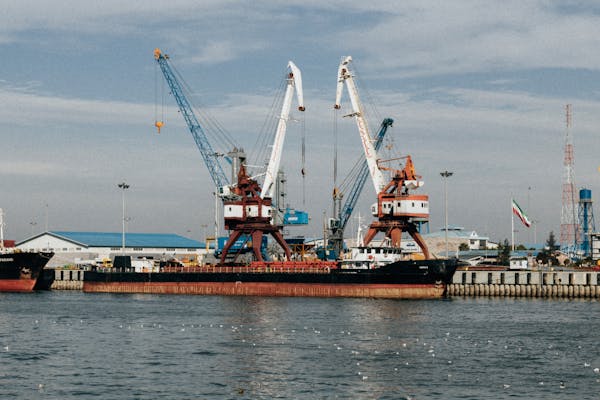I don’t even know how to start writing this.
Maybe because no words feel enough right now.
Maybe because when you’re standing in a place where everything smells like smoke and blood, your brain kind of stops working normally.
Bandar Abbas is broken.
Not just the buildings — the people, too.
And nobody knows if it’ll ever be the same again.
It was supposed to be an ordinary Sunday.
Kids going to school.
Fishermen heading out early.
Port workers loading crates in the sticky morning heat.
And then — boom.
Not just a sound — it felt like the ground lifted, like the whole sea jumped, like something inside your chest cracked.
Where I Was
I wasn’t supposed to be near the docks.
But a friend had asked for help moving some equipment.
We were drinking tea, joking about the heat, when everything exploded.
First the windows.
Then the floor.
Then screams.
You don’t think in moments like that.
You just move.
I still don’t remember how we got outside.
The Blast
They say it started with a fire.
They say there were dangerous chemicals stored improperly.
But nobody really cares about technicalities right now.
All I saw was:
- A wall of black smoke, thick and oily, eating the sky
- Flames rolling across the port like they were alive
- A noise so loud it knocked birds out of the sky
One old man, standing barefoot in the street, just kept muttering:
“The sea is angry. The sea is angry.”
The Deaths
Forty-six bodies, at least.
That’s the official number.
But ask anyone here — it’s probably more.
Way more.
Because there are still people missing.
Because some bodies were burned so badly they’re unrecognizable.
Because some families are too scared to even start looking.
In the hospital corridors, mothers scream their children’s names.
Fathers sit silently, hands shaking, staring into nothing.
One nurse whispered to me:
“We don’t have enough bags for the dead.”
Faces I Can’t Forget
I saw a woman collapse in front of the hospital gates.
She kept holding up a photograph — a teenage boy, smiling, wearing a cheap soccer jersey.
She kept saying:
“Have you seen him? Please, he’s all I have.”
Nobody had the heart to tell her the truth.
The Rescuers
God bless the firefighters.
They ran straight into hell — no masks, no proper suits, just guts and duty.
Some didn’t come back.
A fire captain named Hassan — I met him once at a charity event — died when a burning roof caved in.
He leaves behind two daughters, ages 6 and 8.
His neighbor told me:
“He used to say he wasn’t afraid of fire. Said he was afraid of forgetting why he did the job. He never forgot.”
The Smell
Nobody tells you about the smell.
Burned plastic.
Burned wood.
Burned flesh.
It sticks to your skin.
It gets in your nose and stays there, even after you shower.
Even after you scrub your hands raw.
It smells like the end of the world.
What Went Wrong?
They’ll launch an investigation, of course.
They’ll set up a committee, write a thick report, point fingers.
They’ll say:
- Poor safety standards
- Corrupt managers
- Ignored warnings
And maybe it’s all true.
But deep down, we all know the real cause:
Greed. Laziness. A system that doesn’t care about ordinary lives until it’s too late.
Bandar Abbas isn’t the first city to bleed because of it.
It won’t be the last.
The Silence
After the fires died down, after the last ambulance raced away, there was a terrible silence.
Not peace.
Not calm.
Just silence, heavy and wrong, like the city itself was holding its breath.
Even the seagulls stopped crying.
Small Acts of Kindness
In the middle of all this horror, you still see good.
- A boy, maybe 12 years old, handing out bottled water to rescue workers.
- A cab driver refusing to take money from anyone going to the hospital.
- Nurses who haven’t slept in 30 hours still smiling at scared patients.
Human beings can be monsters sometimes.
But they can also be angels.
What Happens Next?
Nobody knows.
Rebuild, they say.
Move on, they say.
But how do you rebuild when you can’t even bury all your dead?
How do you move on when every street corner smells like smoke and sorrow?
Maybe we don’t.
Maybe we just learn to live with the hole inside us.
A City in Mourning
They’re planning mass funerals.
Rows and rows of coffins.
Rows and rows of broken hearts.
The mosques are full.
So are the graveyards.
And people light candles, and cry, and hug each other without saying anything.
Because sometimes words just aren’t enough.
Final Thought
This wasn’t just an explosion.
It was a reminder — brutal and bloody — that life is fragile, safety is a lie, and no one is ever really ready for the end.
Say a prayer for Bandar Abbas, if you can.
Or just hold your loved ones a little tighter tonight.
Because you never know when your world will explode, too.
